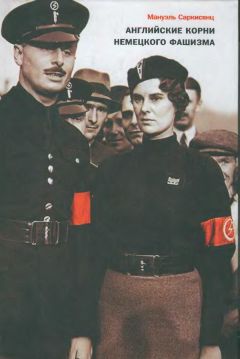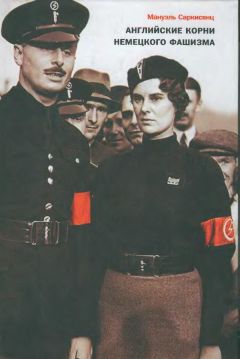Мануэль Саркисянц - Английские корни немецкого фашизма: от британской к австро-баварской «расе господ».
374
232n. H. F. Guessen, Lecture "Carlyle and Hitler": Klaus Schreiner, "Wann kommt der Retter Deutschlands? Formen und Funktionen des politischen Messianismus in der WeimarerRepublik", in Saeculum, XLIX (1998), S. 15.
375
232o. Tennyson, quoted in: Matthew Arnold, Culture and Anarchy (1965), pp. 150 f; Herbert Beer, Fuhrers und Folgen. Herrschen und Beherrscht werden im Sprachgut der Angelsachsen: Ein Beitrag zur Erforschung von Fuhrertum und Gefolgschaft (Breslau, 1939), cited in: G. StrobI, The Germanic Isle. Nazi perceptions of Britain (Cambridge, 2000), pp. 83f, 243.
376
233. Thomis & Holt, Threats of Revolution in Britain, p. 128.
377
234. John Morley, The life of Richard Cobden (London, 1903), p. 130.
378
234a. Thomis & Holt, Treats of Revolution in Britain, p. 23; G. M. Trevelyan, History of England, Vol. Ill (New York, 1952), p. 85, 87, 89–92.
379
235. Thomis & Holts, Treats of Revolution in Britain, p. 128; cf. E. S. Thompson, The Romantics. England in a revolutionary age (New York, 1997), pp. 9, 43, 16, 2, 165; Wingfield-Stratford, The Squire and his Relations, p. 246; Don Herzog, Poisoning the mind of the Lower Orders, p. 124f.
380
235a. Kenneth Neill Cameron, The Young Shelley. Genesis of a Radical (New York, 1950), p. 160.
381
236. David Worrall, Radical Culture. Discourse, Resistance and Surveillance 1790–1820 (Detroit, 1992), pp. 6–7, 60–61, 68; William Blake, Poems. Edited by W H. Stevenson (London, 1971), p. 194; Geoffrey Pearson, Hooligan. A history of respectable fears (New York, 1983),p. 180, 157; A. L. Motion, Volksgeschichte Englands (Ost-Berlin, 1956), S. 385, 433, 406, 435, 480; Kenneth Neill Cameron, The Young Shelley, Genesis of a radical (New York, 1950), S. 160; Friedrich Heer, Europa, Mutter der Revolutionen, S. 40f.
382
237. Matthew Arnold, Culture and Anarchy (1867) (New Haven, USA, 1994), p. 77.
383
238. Ibid., p. 147 mit Anfuhrung von George Canning, «Anti-Jacobin». 238a. Friedrich Heer, Europa, Mutter der Revolutionen, S. 31.
384
239. Thomis & Holt, Threats of Revolution in Britain, p. 23, 130; Gerald Newman, Rise of English Nationalism (London, 1977), pp. 209, 231, 232; Christopher Husbands, "Racial attacks, Persistance of racial harassment in Britain's cities": T. Kushner and K. Lunn (Editors). Traditions of Intolerance… in Britain (Manchester, 1989), p. 98.
385
239a. Raphael Samuel (Editor), Patriotism. The making and unmaking… Vol. I (1989), pp. 266–268; G. Pearson, Hooligan. A history of respectable fears (as note 236), p. 159.
386
240. G. E. Watson, English Ideology. Studies in the language of Victorian politics (London, 1973), p. 190, quoting A. Tocqueville, Journeys to England and Ireland of 1835 (London, 1968), p. 60; Gerwin StrobI, The Germanic Isle. Nazi perceptions of Britain (Cambridge, 2000), p. 31; Lord Selbourne quoted in G. R. Searle, Corruption in British politics 1895–1930 (Oxford, 1987), p. 116; Paul Kennedy & A. Nicholls (Hrsg.), Nationalist and racialist movements in Britain (Oxford, 1981), S. 30.
387
241. Heinrich Himmler, Geheimreden, S. 44.
388
241a. Thomis & Holt, Threats of Revolution in Britain, S. 28; Joseph Goebbels, "Erziehung und Fuhrerschicht": Nationalsozialistisches Jahrbuch (Munchen, 1930), S. 180, 181.
389
241b. Christoph Jahr, Gewohnliche Soldaten, Desertion und Deserteure im deutschen und britischen Heer 1914–1918 (Gottingen, 1998), S. 18, 162, 205, 240, 338, citing Julian Putkowski and Julian Sykes, Shot at Dawn (Barnsley, 1993), p. 243.
390
241a. Thomis & Holt, Threats of Revolution in Britain, S. 28; Joseph Goebbels, "Erziehung und Fuhrerschicht": Nationalsozialistisches Jahrbuch (Munchen, 1930), S. 180, 181.
391
242. Philip Mason, Prospero's Magic. Some thoughts on Class and Race (London, 1962), p. 106; John Higham, Strangers in the Land. Patterns of American Nativism 1860–1925 (Westport, USA, 1981), S. 138, zitiert "Business Magazine" Public Opinion (1886), S. 355: "Age of Steel".
392
243. Adolf Hitler, Mein Kampf (Munchen, 1940), S. 251; vgi. Schwind-Waldeck, Wie deutsch war Hitler? (Frankfurt, 1979), S. 165.
393
63. Horst Kuhn, Faschistische Kolonialideologie und der Zweite Weltkrieg (Ost-Berlin, 1962), S. 100.
394
64. General von Lettow-Vorbeck, Mein Leben (Biberach, 1957), S. 183, 189.
395
244. Arthur Marwick, The Home Front. The British and the Second World War (London, 1976), pp. 36f; Peter and Leni Gillman, "Collar the Lot!" How Britain interned and expelled its Wartime Refugees (London, 1990), p. 286; Hubertus Prinz zu Lowenstein, Abenteurer der Freiheit (Frankfurt, 1983), S. 231; R. Thurlow, Fascism in Britain (New York, 1987), p. 221; R. Cecil, The Myth of the Master Race, p. 176.
396
245. James Drennan, Der britische Faschismus und seine Fuhrer (Berlin, 1934), S. 230.
397
246. Hannah Arendt, Elemente und Ursprunge totaler Herrschaft (Frankfurt, 1955), S. 126; Cecil Rhodes (1895) quoted in Robert Colls and Philip Dodd (Editors), Englishness. Politics and Culture 1880–1920 (London, 1986), p. 46.
398
247. Disraeli to Lord George Bentinck, quoted in: Wingfield-Stratford, History of English Patrintism (London, 1913), Vol. II, p. 545.
399
248. Carl Schmitt, Glossarium. Aufzeichnungen der Jahre 1947–1951. Hrsg. von Eberhard von Medem (Berlin, 1991), S. 142: 1. Mai, 1948; Arendt, p. 128.
400
249. Disraeli, Tancred or The New Crusade = Benjamin Disraeli, Novels and Tales, Band X (London, 1927), p. I53f.
401
249a. Esme Wingfield-Stratford, History of English Patriotism, II, p. 547, 546.
402
250. Disraeli, "Life history of Lord Bentick" (1853), zitiert bei H. Ruhl, Disraelis Imperialismus und die Kolonialpolitik (Leipzig, 1935), S. 411; Wingfield-Stratford, p. 546, 547.
403
251. Disraeli, Tancred, p. 153f.
404
252. Walter E. Houghton, The Victorian frame of mind 1830–1870 (New Haven, 1970), p. 325.
405
253. Randall Bytwork, Julis Streicher (New York, 1983), p. 133.
406
254. Esme Wingfield-Stratford, History of English Patriotism, II, p. 545.
407
255. Ibid., p. 545.
408
256. G. E. Watson, The English Ideology. Studies in the language of Victorian politics (London, 1973), p. 202, 204.
409
257. Benjamin Disraeli, Lothair = Benjamin Disraeli, the Earl of Beaconsfield, Novels and Tales, Band XI (London, 1927), p. 397.
410
258. Arendt, S. 128.
411
259. Disraeli, Tancred or The New Crusade = Benjamin Disraeli, Novels and Tales, Band X (London, 1927), p. 270, 271.
412
260. Arendt, S. 128.
413
261. Benjamin Disraeli, Lothair = Benjamin Disraeli, the Earl of Beaconsfield, Novels and Tales, Band HI, iii (London, 1927), p. 34: Ruhl, Disraelis Imperialismus, S. 53.
414
262. Ruhl, S. 52f.
415
263. Ruhl, S. 59.
416
264. Arendt, S. 126.
417
265. Morris S. Lazaron, "Benjamin Disraeli", in: Seed of Abraham (New York, 1930), angefuhrt bei Hannah Arendt.
418
266. Arendt, S. 119.
419
267. Benjamin Disraeli, Coningsby or The new genius (1844), Bok IV, Chapter xiii = Disraeli, the Earl of Beaconsfield, Novels and Tales, Vol. VIII (London, 1927), p. 253.
420
268. Disraeli, Coningsby, IV, x: Arendt, S. 125.
421
269. Arendt, S. 127.
422
270. Disraeli, Lothair = Benjamin Disraeli, Novels and Tales, Vol. XI, p. 397.
423
271. Disraeli, Lothair, Kapitel xxix: Disraeli, Novels and Tales, XI, p. 134.
424
272. Disraeli, Lothair, Novels and Tales, Vol. XI, p. 131.
425
273. Disraeli, Lothair, Novels and Tales, XI, p. 381.
426
274. Ibid., p. 390.
427
275. Ibid., p. 387.
428
276. Disraeli, Lothair, Chapter xxix, ibid., p. 132.
429
277. Disraeli, Lothair, ibid., p. 459.
430
278. Disraeli, Lothair, Chapter xxix, ibid., p. 132.
431
279. Ibid., p. 133.
432
280. Ibid., p. 131.
433
281. Ibid., p. 133–134.
434
281a. Arendt, S. 125.
435
282. Esme Wingfield-Stratford, History of English Patriotism, Band II (London, 1913), p. 551.
436
283. Disraeli, Lothair, xxix, ibid., p. 133.
437
284. Wingfield-Stratford, II, p. 559.
438
285. Ibid., S. 534, 536f.
439
286. Disraeli, Londoner Kristallpalast-Rede vom 24. Juni 1872: Earl of Beaconsfield, Selected Speeches, Edited with an introduction by Т. E. Kobbel, II (London, 1882), p. 524.
440
287. Oskar A. H. Schmitz, Englands politisches Vermachtnis an Deutschland durch Benjamin Disraeli, Lord Beaconsfield (Munchen, 1916), S. 395.
441
288. Wingfield-Stratford, II, 563.
442
65. Landes-Hauptarchiv Staatsministerium Schwerin, A 2, Vorgang 26 (vom 25.III. 1920), angefuhrt bei Horst Kuhn, op. cit. S. 100; Norddeutsche Zeitung vom 23. Marz 1920: "Die Unruhen in Schwerin", zitiert nach Martin Polzin, Kapp-Putsch in Mecklenburg (Rostock, 1966), S. 101.
443
289. Schmitz, S. 433.
444
290. Ibid., 414, 430.
445
291. Wingfield-Stratford, II, p. 562.
446
292. Ibid., II, 561.
447
293. Disraeli, Sibil or The Two Nations (1845), Book IV, Chapter viii = Benjamin Disraeli, the Earl of Beaconsfield, Novels and Tales, Ы. IX (London, 1927), p. 77, 285.
448
293a. Earl of Selborne, Draft of letter to the Editor of the "Morning Post", July 1912, quoted in: G. R. Searle, Corruption in in British politics (Oxford, 1987), p. 116.
449
293. Disraeli, Sibil or The Two Nations (1845), Book IV, Chapter viii = Benjamin Disraeli, the Earl of Beaconsfield, Novels and Tales, Ы. IX (London, 1927), p. 77, 285.
450
294. Schmitz, S. 116, 333.
451
295. Carl Peters, Nationalpolitisches Vermachtnis. Der Deutsche und sein Lebensraum (Hannover 1938), S. 51ff.
452
296. G. E. Watson, English Ideology (London, 1973), p. 199.
453
297. V. G. Kiernan, Lords of Humankind (London, 1969), p. 58.
454
297a. D. C. Somervell, Geistige Stromungen in England im neunzehnten Jahrhundert (Bern, 1946), S. 276f.
455
66. Lettow-Vbrbeck, Mein Leben, S. 192.
456
298. C. P. Lucas, Greater Rome and Greater Britain (Oxford, 1912), p. 108; D. C. Somervell, Geistige Stromungen in England im 19. Jahrhundert (Bern, 1946), S. 276f.




